|
|
|
Sort Order |
|
|
|
Items / Page
|
|
|
|
|
|
|
| Srl | Item |
| 1 |
ID:
133610
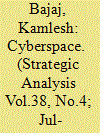

|
|
|
|
|
| Publication |
2014.
|
| Summary/Abstract |
Just as the world was beginning to understand the various dimensions of cyberspace in general, and internet governance in particular, it received the rude shock of the Snowden revelations about the global surveillance carried out by the United States National Security Agency (NSA) in the name of counterterrorism. All kinds of electronic communications of US citizens and non-citizens alike were monitored. Phone tapping and electronic interception were part of this huge operation to collect a haystack of data in the hope of detecting terrorist links to protect national security. The stories that are emerging from the NSA documents made available by Edward Snowden since June 2013 in the Guardian, the New York Times, Der Spiegel and the Washington Post continue to surprise, enrage or shame people depending upon the nation or group that they belong to. The whole world, including those who work for spy agencies, is surprised at the enormity of the scale of surveillance.
|
|
|
|
|
|
|
|
|
|
|
|
|
|
|
|
| 2 |
ID:
126441
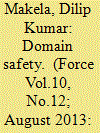

|
|
|
|
|
| Publication |
2012.
|
| Summary/Abstract |
The stage for the cyber war has already been set, albeit secretly. In the last two months, the revelations made by the US' ex-Central Intelligence Agency employee, Edward Snowden, in various interviews to The Guardian newspaper, revealed that the US' intelligence organisation, National Security Agency (which had launched the top-secret PRISM programme) was snooping on personal data of individuals and governments in the US and across the world through the internet. He also revealed that the National Security Agency (NSA) intercepted a big chunk of sensitive information that belongs to India by spying on the embassies and their diplomatic missions. And perhaps the most daunting revelation was that the information sharing between the intelligence agencies of various countries, such as the US and the UK, is already underway.
|
|
|
|
|
|
|
|
|
|
|
|
|
|
|
|
| 3 |
ID:
134056
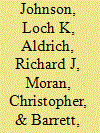

|
|
INS special forum: implications of the Snowden leaks
/ Johnson, Loch K; Aldrich, Richard J; Moran, Christopher,; Barrett, David M, Hastedt, Glenn, Jervis, Robert, Krieger, Wolfgang, McDermott, Rose, Omand, David, Phythian, Mark, Wark, Wesley K
|

|
|
|
|
| Publication |
2014.
|
| Summary/Abstract |
In 2013, the National Security Agency (NSA) in the United States became embroiled in controversy - again. Its questionable use of wiretaps (Operation MINARET) and its improper reading of international cables sent and received by Americans over decades (Operation SHAMROCK) had been revealed by the Church Committee in 1976; and in 2005 the New York Times disclosed that the NSA had been wiretapping selected American citizens without a warrant, contrary to the Foreign Intelligence Surveillance Act of 1978.
|
|
|
|
|
|
|
|
|
|
|
|
|
|
|
|
| 4 |
ID:
130474
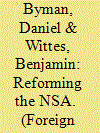

|
|
|
|
|
| Publication |
2014.
|
| Summary/Abstract |
The long-running debate over the tradeoffs the United States should make between national security and civil liberties flared up spectacularly last summer, when Edward Snowden, a National Security Agency contractor, handed journalists a huge trove of heavily classified documents that exposed, in excruciating detail, electronic surveillance programs and other operations carried out by the NSA. Americans suddenly learned that in recent years, the NSA had been acquiring the phone and Internet communications of hundreds of thousands of U.S. citizens, as well as collecting massive volumes of bulk telephone records known as "metadata" -- phone numbers and the time and length of calls. Along with the rest of the world, Americans found out that the NSA had broken common forms of online encryption, tapped the phones of various foreign heads of state, and monitored global communications far more aggressively than was previously understood.
|
|
|
|
|
|
|
|
|
|
|
|
|
|
|
|
| 5 |
ID:
132473
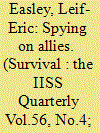

|
|
|
|
|
| Publication |
2014.
|
| Summary/Abstract |
Although some programmes crossed lines of propriety, US surveillance of partners did not constitute a breach of trust.
The United States is accused of monitoring the communications of other countries and collecting data on Internet users worldwide, following disclosures made by Edward Snowden, a former National Security Agency (NSA) contractor. US President Barack Obama implied that he did not order the NSA programmes for listening in on over 35 world leaders, including not only those of threatening states, but also those of allies, friendly countries and the United Nations.
|
|
|
|
|
|
|
|
|
|
|
|
|
|
|
|
| 6 |
ID:
130228
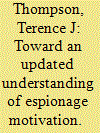

|
|
|
|
|
| Publication |
2014.
|
| Summary/Abstract |
The case of Edward Snowden, who in May 2013 revealed a huge number of National Security Agency codes, has again raised the question of motivation in espionage and disclosure of documents.
Espionage is a crime with complex, multi-faceted motivational factors that do not lend themselves to easy explanation. Most cases present a singular mosaic of intersecting psychosocial forces which culminate in a decision to engage in the crime. Espionage is committed by individuals from the lower middle to upper middle classes; unlike street crime, it is rarely, if ever, committed by the poor. What drives people of middle class privilege to choose to commit such a heinous crime?
The current model, postulated by numerous scholars and simplified here, holds that espionage occurs at the collision of an opportunity, a perceived life crisis, and a moral failing, which is then actuated by a trigger. 1 The spy must have an opportunity, which usually translates into access to information or a person. Access to information is typically gained through the holding of a security clearance. Such a trusted insider has minimally restrained access to classified information, and that access is usually defined by position. A senior scientist working on satellite systems obviously has significant access to classified satellite data but may have almost no access to human intelligence (HUMINT)-and vice versa. Conversely, and perhaps surprisingly, according to one study, 25 percent of known spies since World War II have held no security clearance. 2 These spies usually acted in concert with another individual (often a spouse or lover), or simply knew someone who did have access. This was the case in the Boyce-Lee case in California wherein Christopher Boyce held a security clearance and Dalton Lee did not. 3 Access, however derived, represents the most common opportunity to commit espionage.
|
|
|
|
|
|
|
|
|
|
|
|
|
|
|
|
| 7 |
ID:
132398


|
|
|
|
|
| Publication |
2014.
|
| Summary/Abstract |
The revelations from the former National Security Agency contractor, Edward Snowden, in July 2013 will have an enduring impact on the modern business of intelligence and the communication strategies of governments and non-state based adversaries alike. Snowden's revelations do not mark a fundamental divergence from the general understanding of intelligence. In making these implied understandings public, however, Snowden has changed the political dynamic around mass surveillance. The revelations amplify a tension within several layers of social contract from interactions between governments to those between governments and citizens. Long-term, diplomatic relations between the US and European governments should remain largely unaffected.
|
|
|
|
|
|
|
|
|
|
|
|
|
|
|
|
|
|
|
|
|